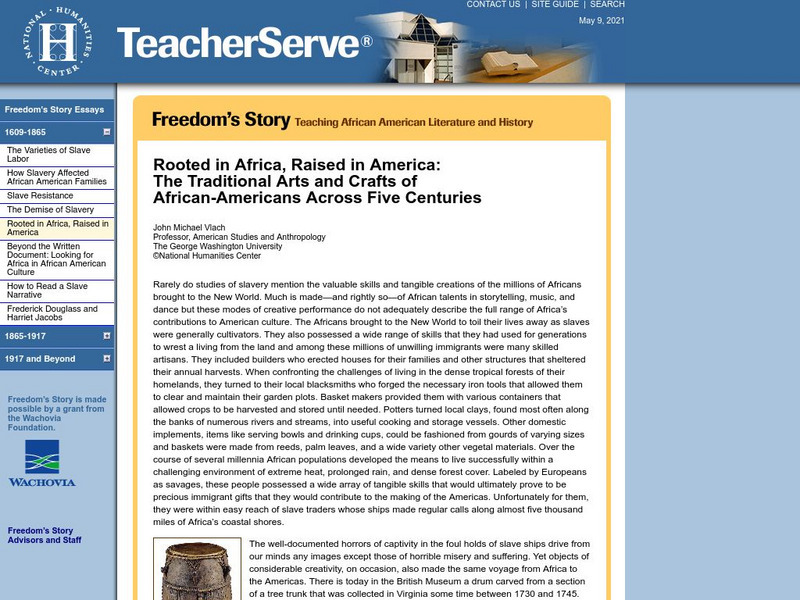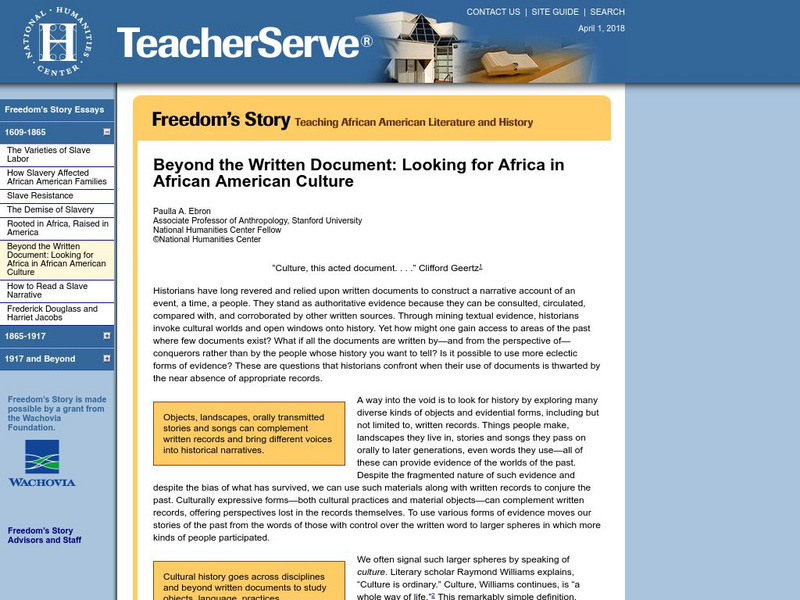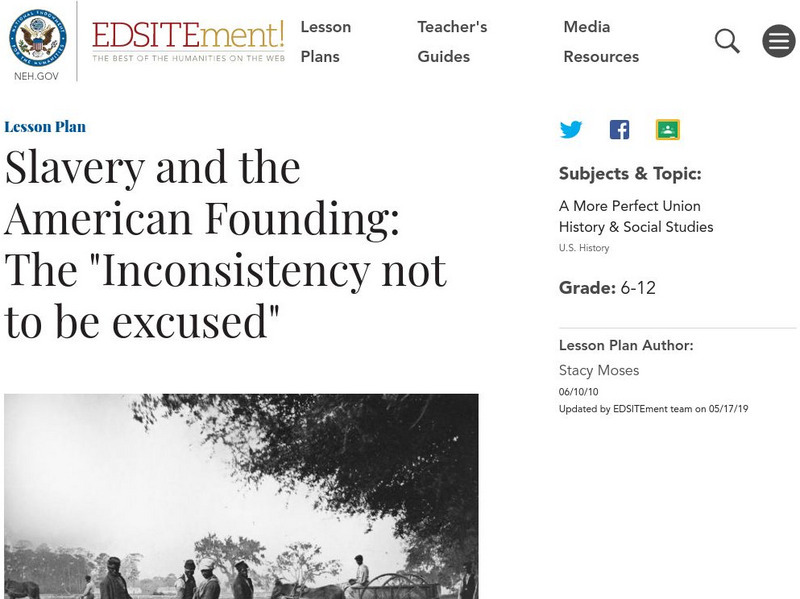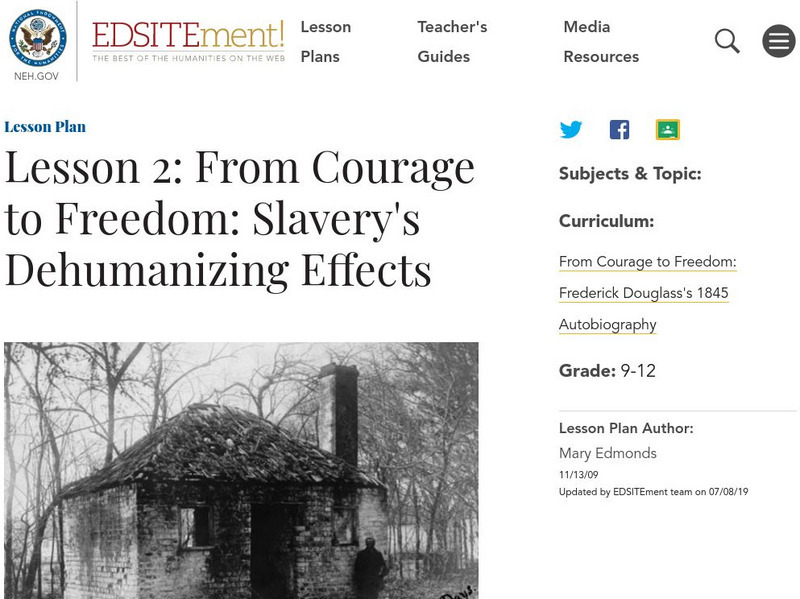Digital History
Digital History: Slavery and the Slave Trade [Pdf]
Read reconstructions of debates by delegates to the Constitutional Convention as they attempted to come to terms with slavery, the slave trade, and how to address the issue in the Constitution so all states would be willing to ratify it....
Digital History
Digital History: Solomon Northup and Mammy Harriet [Pdf]
Solomon Northrup, a free man, was captured and sold into slavery. Read his account of what plantation life was like from his book, 12 Years a Slave. In addition, read the remembrances of a house slave and what her life was like. [pdf]
Digital History
Digital History: The Life Cycle of a Slave [Pdf]
Read excerpts from these slave and ex-slave narratives to find out what the life of a slave was like through all stages of life--childhood, marriage, and old age. See the heartbreak of mothers being separated from their children, and...
Digital History
Digital History: Methods of Controlling Slaves [Pdf]
Slave masters felt that controlling slaves was a necessity. Read about three ways slaves were controlled in the slavery system, and read an account by Frederick Douglass about how his master, in particular, kept his slaves in line. [pdf]
Digital History
Digital History: Responses to Slavery: Spirituals and Stories [Pdf]
Find the lyrics to spirituals slaves sang that gave a glimpse into their lives and gave them hope for freedom. In addition, read some of the stories slaves told that showed how they offered passive resistance to their plight of slavery....
Digital History
Digital History: Lincoln vs. Douglas [Pdf]
The Licoln-Douglas debates pitted two great speakers who were espousing different courses for the country in regard to the issue of slavery. Read a snopsis of their seven debates and see what four major issues they debated. [pdf]
Library of Congress
Loc: Slavery in the United States: Primary Sources
This lesson introduces students to primary sources- what they are, their great variety, and how they can be analyzed. The lesson begins with an activity that helps students understand the historical record. Students then learn techniques...
University of Groningen
American History: Outlines: Extension of Slavery
Outline on the extension of slavery and U.S. westward expansion, touching on the development of the cotton gin, Northwest Ordinance and Missouri Compromise.
National Humanities Center
National Humanities Center: Teacher Serve: Slave Resistance
Essay explores the beginnings of slave resistance and its various forms. Includes ideas for guiding a student discussion.
National Humanities Center
National Humanities Center: Teacher Serve: The Traditional Arts and Crafts of African Americans Across Five Centuries
Detailed essay provides an overview of Africa's contributions to American culture while discussing how basket makers, potters, and quilters helped preserve American history through their works.
National Humanities Center
National Humanities Center: Teacher Serve: Beyond the Written Document: Looking for Africa in African American Culture
Paulla A. Ebron, professor at Stanford University, takes a look at how objects, landscapes, orally transmitted stories, and songs along with written documents can be used to study cultural history.
National Humanities Center
National Humanities Center: Teacher Serve: Frederick Douglass and Harriet Jacobs: American Slave Narrators
Lucinda MacKethan, English professor at North Carolina State University, offers a comparison of two classic slave narratives: Frederick Douglass's 1845 Narrative of the Life of Frederick Douglass: an American Slave and Harriet Jacobs's...
National Endowment for the Humanities
Neh: Edsit Ement: Slavery and the American Founding
In this lesson plan, students will consider "Slavery and the American Founding: The "Inconsistency not to be excused"." The plan includes worksheets and other student materials that can be found under the resource tab.
National Endowment for the Humanities
Neh: Edsit Ement: Taking Up Arms and Challenge of Slavery in Revolutionary Era
In this lesson plan, students will consider "Taking Up Arms and the Challenge of Slavery in the Revolutionary Era." The plan includes worksheets and other student materials that can be found under the resource tab.
National Endowment for the Humanities
Neh: Edsit Ement: "Twelve Years a Slave": Analyzing Slave Narratives
In this lesson plan, students will consider "Twelve Years a Slave: Analyzing Slave Narratives". The plan includes worksheets and other student materials that can be found under the resource tab.
National Endowment for the Humanities
Neh: Edsit Ement: Twelve Years a Slave: Was Case of Solomon Northup Exceptional?
In this lesson plan, students will consider "Twelve Years a Slave: Was the Case of Solomon Northup Exceptional?" The plan includes worksheets and other student materials that can be found under the resource tab.
National Endowment for the Humanities
Neh: Edsit Ement: The Growing Crisis of Sectionalism in Antebellum America
In this Curriculum Unit, students will consider "The Growing Crisis of Sectionalism in Antebellum America: A House Dividing" in 4 Lessons. The unit also includes worksheets and other student materials that can be found under the resource...
National Endowment for the Humanities
Neh: Edsit Ement: From Courage to Freedom
In this lesson plan, students will consider From Courage to Freedom. Worksheets and other supporting materials can be found under the Resources tab.
National Endowment for the Humanities
Neh: Edsit Ement: Lesson 1: From Courage to Freedom: The Reality Behind the Song
In this lesson plan, students will consider Lesson 1: From Courage to Freedom: The Reality behind the Song. Worksheets and other supporting materials can be found under the Resources tab.
National Endowment for the Humanities
Neh: Edsit Ement: L2: From Courage to Freedom: Slavery's Dehumanizing Effects
In this lesson plan, students will consider Lesson 2: From Courage to Freedom: Slavery's Dehumanizing Effects. Worksheets and other supporting materials can be found under the Resources tab.
Scholastic
Scholastic News: The End of Slavery
January 2, 2013 marked the 150th anniversary of the signing of the Emancipation Proclamation, which ended slavery in the United States. Read about the order and how it was being celebrated on this historical anniversary.
University of Virginia
The University of Virginia Library: Frederick Douglass: The Color Line
Full text of the Frederick Douglass essay "The Color Line."
University of Maryland
Freedmen and Southern Society Project: Emancipation
A website that "captures the essence" of the drama of the emancipation by using the experiences of the liberated slaves, defeated slaveholders, soldiers, civilians, Northerners, and Southerners.
Georgia Humanities Council and the University of Georgia Press.
New Georgia Encyclopedia: Secession
Article that discusses the reasons behind Georgia's secession from the Union in 1861 and how it came to be.


![Digital History: Slavery and the Slave Trade [Pdf] Website Digital History: Slavery and the Slave Trade [Pdf] Website](https://d15y2dacu3jp90.cloudfront.net/images/attachment_defaults/resource/large/FPO-knovation.png)

















